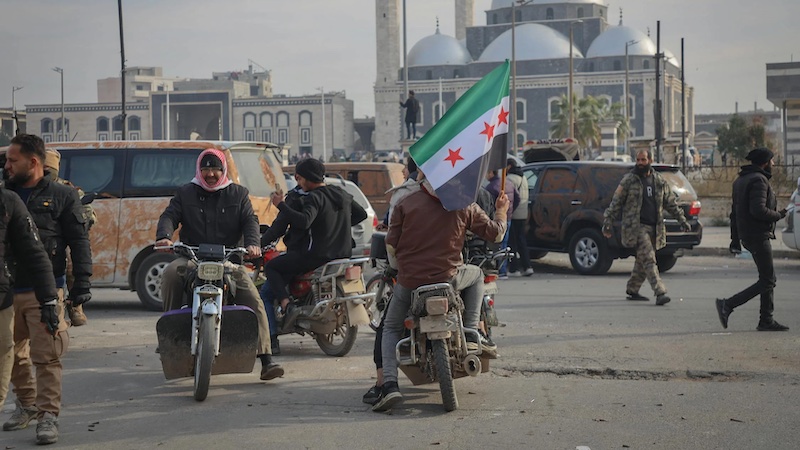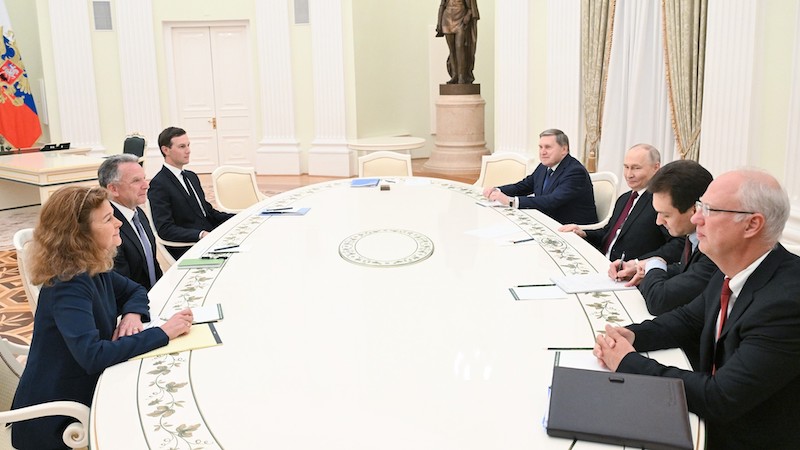Russian President Vladimir Putin rejected a peace proposal from the United States and Ukraine during a meeting with a U.S. delegation in Moscow on...
Vous n'êtes pas connecté
- English
- Français
- عربي
- Español
- Deutsch
- Português
- русский язык
- Català
- Italiano
- Nederlands, Vlaams
- Norsk
- فارسی
- বাংলা
- اردو
- Azərbaycan dili
- Bahasa Indonesia
- Հայերեն
- Ελληνικά
- Bosanski jezik
- українська мова
- Íslenska
- Türkmen, Түркмен
- Türkçe
- Shqip
- Eesti keel
- magyar
- Қазақ тілі
- Kalaallisut ; kalaallit oqaasii
- Lietuvių kalba
- Latviešu valoda
- македонски јазик
- Монгол
- Bahasa Melayu ; بهاس ملايو
- ဗမာစာ
- Slovenščina
- тоҷикӣ ; toğikī ; تاجیکی
- ไทย
- O'zbek ; Ўзбек ; أۇزبېك
- Tiếng Việt
- ភាសាខ្មែរ
- རྫོང་ཁ
- Soomaaliga ; af Soomaali
العناوين :
 Maroc - EURASIAREVIEW.COM - A la une - 18/Jan 00:21
Maroc - EURASIAREVIEW.COM - A la une - 18/Jan 00:21
Russia’s Role In A Post-Assad Syria – Analysis
By Rajoli Siddharth Jayaprakash Former Syrian ruler Bashar al-Assad was Russia’s crucial ally in West Asia, with Russia taking an active role in regional geopolitics since the Syrian civil war began in 2011. In 2015, when Assad’s forces were on the brink of collapse, Moscow intervened and provided critical air support to Syrian and Iranian-backed forces, re-consolidating Assad’s hold over the country. This was also Russia’s first military intervention abroad. However, since 2020, Assad’s reluctance to engage with other factions inside Syria fighting against his regime, coupled with the weakening of the Syrian economy post-COVID, and a devastating earthquake in northern Syria in the summer of 2024, has led to growing discontent. This was exacerbated with Russia being focused on its Ukrainian campaign since 2022, and Hezbollah directing its attention towards countering Israel since last year, which further impacted the morale within the regime’s forces. All these factors resulted in Assad’s hold on power weakening, leading to the Türkiye-backed Hay’at Tahrir al-Sham (HTS) making considerable territorial gains, capturing Aleppo, Hama, and Homs. By 7 December, rebel forces had encircled Damascus. On 8 December, Assad fled to Moscow, marking the end of his 24-year-long rule. Russia’s approach to these recent developments has been pragmatic, with Moscow reaching out to the HTS in hopes of retaining its interests in the region. Engagement with the transitional government Russia’s commitment to the Assad regime remained until its last days, with Russian forces in Khmeimim working with regime forces to thwart the terrorist advance. However, Moscow’s stance shifted following 8 December. The Syrian embassy in Moscow opened under a new flag, and Russian state media began referring to the rebels as “armed opposition” rather than a “terrorist group”. Further, Russian officials were in contact with the HTS, which guaranteed the security of Russian military bases and diplomatic missions in the country. According to the Emirati newspaper The National, talks between Russia and the new Syrian administration are in their early stages, and the Russian military has good relations with the new administration, with no provocations reported or demands for the extradition of Assad. Following Assad’s ouster, Moscow’s operations in Syria have been marked by a shift. Russian President Vladimir Putin, in his annual direct line, stated that the Russian air base in Khmeimim, which was formerly used to strike rebel positions, could be used to deliver humanitarian aid. Putin further stated that the regime’s collapse was not a defeat for the Kremlin, as Russia’s participation in the Syrian civil war was to prevent the creation of a terrorist enclave in Syria. Further, he condemned the Israeli seizure of Syrian territory. Since 8 December, the Kremlin’s stance on Syria has become more flexible, with Russia reaching out to all groups that control the situation in the country. The new transitional government in Syria needs Russia as the HTS needs more partners, and Moscow's backing of the new regime could grant them international legitimacy. In HTS’ calculus, Moscow is more important vis-a-vis Washington, as the latter backs Kurdish rebels and tribal groups in northern Syria. Further, the possible removal of the HTS from Russia’s terrorist list gives the new government legitimacy for a more formal interaction. Recently, Russia’s upper house, the Federation Council, approved a mechanism that suspends a ban on the activities of a terrorist organisation. The amended legislation stipulates the suspension of a ban by court decision and is instead initiated by the decision of the prosecutor general of the Russian Federation or his deputy. The Kremlin has specified that this was to ensure a mechanism for legal interaction between the Taliban and Russia, with no mention of the HTS. However, judging from how Moscow has reacted to the new transitional government in Syria, as well as Ramzan Kadyrov, the head of the Republic of Chechnya in Russia, urging the HTS’s removal from the terror list, it is likely that if HTS were to uphold required criteria, it would be removed from Russia’s terrorist list. A pivotal external balancer in West Asia At the request of Assad, Moscow in 2015 intervened in the Syrian civil war to thwart the Islamic State and opposition forces to the Ba’ath party. Moscow provided air support to Syrian and Iran-backed ground forces, which changed the course of the civil war, shifting in the favour of Assad. Moscow’s first intervention since the collapse of the erstwhile Union of Soviet Socialist Republics (USSR) resulted in Russia not only gaining a foot in the door and becoming an important external balancer in the region but also succeeding in the fight against international terror. In 2017, Russia and Syria signed an agreement that allowed Russia to extend Moscow’s lease on the Tartus naval facility for 49 years, and they signed another deal leasing the Khmeimim airbase for the same period. These bases were a crucial logistics hub and were used to project Russia’s influence in the eastern Mediterranean region, as Syria was Moscow’s stepping stone into Africa. Moscow gained influence in the Middle East, with its increasing political contacts with the Gulf nations. Russia also gained leverage in negotiations with Türkiye and Iran. The former began normalising relations with Assad in return for a seat in the Astana process, which aimed to bring an end to the conflict in Syria and create a buffer zone in Turkey's Southern border. Post-Ukraine developments in West Asia However, since the war in Ukraine began, Russia’s leverage over Syria began to reduce, with Moscow’s dependence on Türkiye increasing for the re-routing of trade. With the Ukraine gas transit deal expiring in January 2025, and the Turkstream pipeline being the only viable mechanism for the transhipment of Russian pipeline gas to Europe, Ankara is in a better position to negotiate terms that give Turkiye the upper hand. Further, as the Russian troop presence was reduced in Syria and redirected to Ukraine, in addition to the Iran-backed Hezbollah tackling Israel since last October meant that rebel factions were strengthened. With Assad’s ouster, Türkiye and Israel’s influence has increased in regional geopolitics, as Moscow’s influence is on a relative decline. Moscow’s relationship with Türkiye and Israel will likely go back to the pre-2015 calculations. What’s next? Despite Russia managing to salvage some of its interests in the country, Assad’s ouster reflects Moscow’s relative power decline in the Middle East. Thus, it is likely that in the short term, Russia will not be able to play a proactive role as it did in the past. Thus, it is expected that Russia will become flexible in its approach to Syria, dealing with the new HTS government and other non-state actors like Moscow dealt with the Taliban, including their possible removal from the terrorist list, and working on post-conflict resolution mechanisms that would help rebuild Syria’s economy. Ultimately, however, Russia’s Middle East strategy in the long term will depend on how the domestic situation in Syria evolves. About the author: Rajoli Siddharth Jayaprakash is a Research Assistant with the Strategic Studies programme at the Observer Research Foundation. Source: This article was published at the Observer Research Foundation.
Articles similaires
Russia Strikes Ukrainian Military-Linked Energy Facilities, Ports
MOSCOW (Sputnik) - The Russian armed forces, in response to Ukraine's terrorist attacks on Russian civilian targets, have carried out overnight...
HRW: Syria One Year Since Assad’s Fall
Syrian transitional authorities have taken positive steps on justice, transparency, and rights but failed to prevent continued violence and...
Syrian president says Israel is ‘fighting ghosts’ and must abide by deconfliction accord
By Tim Lister, Eyad Kourdi, CNN (CNN) — Syrian President Ahmed Al-Sharaa has accused Israel of exporting crises to other countries and...
Syrian president says Israel is ‘fighting ghosts’ and must abide by deconfliction accord
By Tim Lister, Eyad Kourdi, CNN (CNN) — Syrian President Ahmed Al-Sharaa has accused Israel of exporting crises to other countries and...
Ukraine Peace Efforts Further Stalled After US-Kremlin Talks Make Little Headway
Efforts to find a resolution to halt Russia's nearly 4-year-old war on Ukraine appear to hit a brick wall after a Moscow meeting between US...
Ukraine Peace Efforts Further Stalled After US-Kremlin Talks Make Little Headway
Efforts to find a resolution to halt Russia's nearly 4-year-old war on Ukraine appear to hit a brick wall after a Moscow meeting between US...
Canada drops terror sanctions on Syria, following US lead
Canada on Friday removed Syria from its list of states that support terrorism, and revoked Hayat Tahrir al-Sham's (HTS) designation as a "terrorist...
Canada drops terror sanctions on Syria, following US lead
Canada on Friday removed Syria from its list of states that support terrorism, and revoked Hayat Tahrir al-Sham's (HTS) designation as a "terrorist...
Syria returns to global stage: Rebuilding diplomacy in year since Assad’s fall
‘The new Syrian government had more diplomatic engagements with the international community in a year than the Assad regime had in 54...
أحدث الإصدارات
-
American Airlines invites AAdvantage members to help make a dierence this Giving Tuesday
AMERICAN AIRLINES - 01/12/2025
-
American Airlines to present at Goldman Sachs and Bernstein conferences
AMERICAN AIRLINES - 26/11/2025
-
American Airlines gets ready to unwrap deals for travelers this holiday season
AMERICAN AIRLINES - 25/11/2025
-
Belkin Expands Audio Range in the Middle East with SoundForm Anywhere True Wireless Earbuds
Belkin - 24/11/2025
-
Border Patrol Agents Face Shots Fired, Vehicle Rammings, Bricks Thrown in Chicago on Saturday
Amazon Web Service - 09/11/2025
-
Border Patrol Agents Face Shots Fired, Vehicle Rammings, Bricks Thrown in Chicago on Saturday
The Department of homeland security - 09/11/2025
-
ICE Arrests Worst of the Worst Criminal Illegal Aliens Including Pedophiles, Rapists and Violent Assailants
The Department of homeland security - 07/11/2025
-
DHS Sets the Record Straight on Misleading Video, Leaving Out Key Facts Including that the Woman Arrested Repeatedly Stabbed Her Coworker with Scissors
The Department of homeland security - 07/11/2025
-
United Airlines Launches MileagePlus Debit Rewards Card that Earns Miles for Spending and Saving
UNITED AIRLINES - 04/11/2025
-
American Airlines and AAdvantage members donate more than $1.2 million for Hurricane Melissa relief eorts
AMERICAN AIRLINES - 31/10/2025


